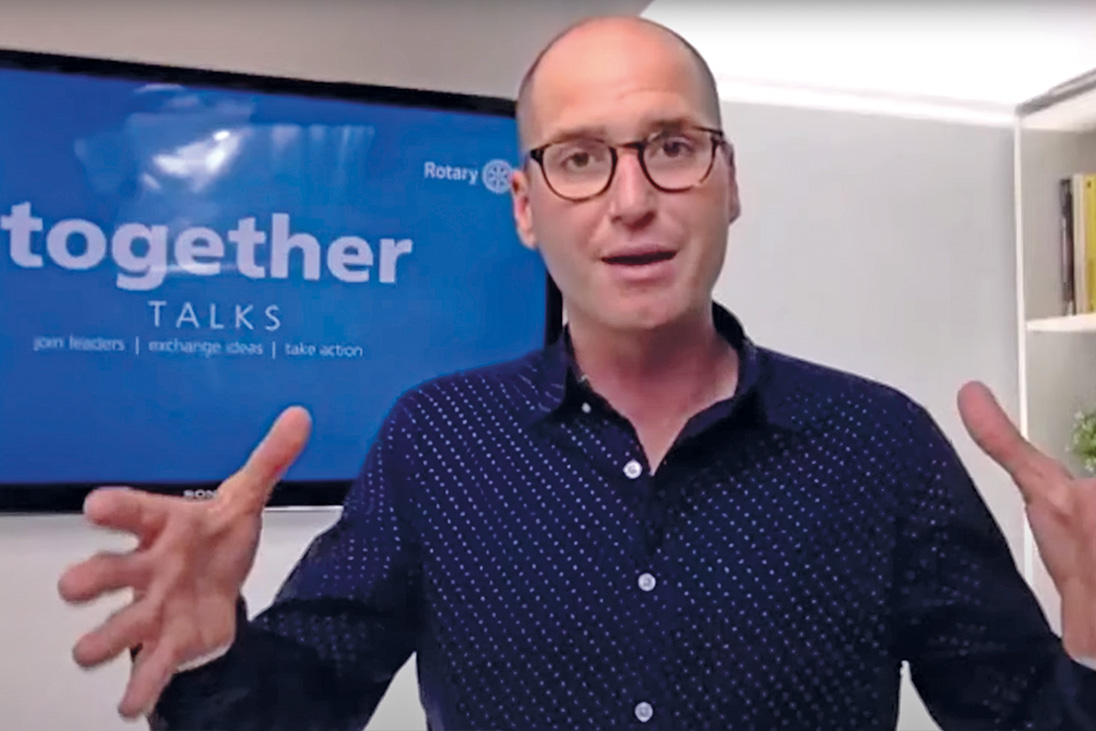What do you mean about maintaining momentum in tough times?
Congratulations on the togetherTalks, because this is symbolic about what maintaining momentum is all about.
We have heard the term uncharted territory, and we are all in it. I was talking to my 95-year-old grandmother yesterday.
She has seen a lot, but nothing like this. So we are entering a period which is incredibly uncertain and, let’s be frank, which is incredibly scary for a lot of us.
I love initiatives like the togetherTalks because this is what maintaining momentum is – where you quickly adapt. You re-invent yourself as crisis hits, staying true to what you are all about, and not losing sight of that.


Michael Mcqueen as a guest on TogetherTalks
We all know that necessity is the mother of invention, and that’s what I have been encouraged to see over the last few weeks.
In the world of Rotary, there is this willingness to pivot, to adapt in the face of adversity.
Great organisations aren’t created by crisis, they are revealed in a crisis. What we are seeing now are organisations which know what they stand for, have really good values and a clear sense of purpose, and these are the ones rebounding most quickly.
I am encouraged to see this in the Rotary world. So many clubs can’t meet in person, so they are saying ‘how can we meet in communities that impact our community online?’
I know you are inspired by Winston Churchill. Is there a particular quote which inspires you?
The day the world fell apart, I was watching the news on my phone, when I saw how quickly COVID-19 was spreading, I remembered this quote from Winston Churchill: ‘A crisis is a terrible thing to waste’.
A crisis is a terrible thing to waste.”
Every organisation at some point faces a crisis, it’s just that we have faced this one at exactly the same time. This is unprecedented. But we can learn a lot from other organisations who faced many crises before, but didn’t let them go to waste, and emerged from those times stronger as a result.
You have helped develop a formula to help people overcome fear, and focus on momentum. Tell us about it.
When I sat down to write a book about momentum four years ago, I had looked at so many organisations looking at the rise and fall of brands and businesses. The thing which kept coming up was momentum.
Businesses which last the distance and stay relevant over the long haul often by mistake, rather than a conscious act of genius, figure out how to maintain the momentum and inner dynamism.
So the formula which resonated when I looked at those businesses and organisations which had maintained momentum was three things: Momentum = A + F x C.
And those three elements were Activity + Focus x Consistency.
All of those three elements are critical and relevant to what we are facing right now. The point is how do you not get paralysed by fear in this moment?
Businesses which last the distance and stay relevant over the long haul often by mistake, rather than a conscious act of genius, figure out how to maintain the momentum and inner dynamism.”
And if you look at the focus part of the equation, a big part of it is choosing what do you focus on right now?
The danger right now is that we are trying to focus to get back to where we were, trying to reclaim the world where it existed before this crisis and that is pretty futile.
We have to be mindful what are we focusing on? What are we filling our hearts and our heads with? What you magnify, dominates you.
So for a lot of us right now, this is a chance to get back to some of the fundamental questions such as: what are the values which we hold to be true, what is the real purpose we are working towards now and focus on that stuff which gives energy and life, focusing on what is good rather than what is lacking, focusing on who you can help rather than how much life sucks right now.
And this is what Rotary does so well: shifting your focus on how I can serve, how I can give. It starts to deal with a lot of those fears which erode our mental sense of balance and well-being.
And what do you mean by the third element: consistency?
We all know about consistency from the youngest age from those old fables: slow and steady wins the race. We all know that but we struggle to live that out.
The simple reality is that there is no short-cut towards achieving long-term success in anything. There is no substitute for doing the right activities in a focused way for long enough to see results.
That’s why consistency is so critical. We know this, but it is hard to live it out. So in my research around consistency, I look at how do we build in daily rhythms and habits so that we do the things required to not only achieve success, but maintain it consistently over time?
Habits are difficult, but so powerful. There is a great book I read last year, by James Clear called ‘Atomic Habits’, whose premise is you can either break or build your life by the habits you form every single day.
The simple reality is that there is no short-cut towards achieving long-term success in anything.”
APJ Abdul Kalam, a former President of India, put it well. He said you don’t get to decide or control your future, your habits decide your future.
For all of us right now, it is consistency of routines and habits. Particularly when, and let’s be mindful, no-one is forcing you to do a lot of stuff on a daily basis. You are working from home.
You can let any number of those daily routines that would normally keep you on track slip right now.
So when we come out of this time period, it is those who have maintained some daily routine of discipline and rigour, just consistently doing the right things, even when no-one is watching or applauding, they are the ones who will emerge from this time well.
You have come out with an interesting concept, the productivity blueprint. Can you explain how that works?
This is about how do you leverage every block of time you have got. I studied high capacity individuals and organisations, and the thing they have in common is they are ruthlessly intentional about how they use their time.
Everything they do has a sense of purpose or intentionality behind it. Even when they rest, they are resting with intentionality – they are not floating from one thing to the next.
So, intentionally how you use your time is so important. The productivity blueprint is how do you approach every block of time intentional about the things you engage in.
The core of it is the good, old-fashioned ‘to do’ list, starting the day with some sense of what you want to achieve.
The productivity blueprint is how you move through your ‘to do’ list. The sequence with which you do things.
Think of your ‘to do’ list as one of three categories – the simple, the complex and the routine. The key challenge with any block of time is to use the first 20% to do the simple stuff, the things which get you off ‘go’. Because that is where momentum is built.
Everything they do has a sense of purpose or intentionality behind it. Even when they rest, they are resting with intentionality – they are not floating from one thing to the next.”
That is where you get into a flow state. Newton’s first law of motion is the law of inertia. The hardest thing is to get off ‘go’. Once you are moving it is easier to speed up and direct your energies.
Start with the simple things, turn your attention to the complex tasks on your list, and then spend the last 40% block of time doing the routine, admin stuff.
And this is why having intentionality is so important. If you don’t have that, how do most of us spend our time? You open your laptop and you start doing the routine things responding to emails. It is the tail wagging the dog.
It is one of those things, when you get to the end of the day, and you have been so flat out and busy, but you don’t actually know what you got done.
What you are seeing is a lack of intentionality about how you use your time.
One of the things we need to apply is: control the controllables. Although there is not a lot we can control right now, you can control what you can do and what you can think.
How do we control the things which are in our grasp, and for a lot of us, these are the simple things but the stuff a lot of us are not doing right now.
What are your three takeaways?
- Don’t let this crisis go to waste:
Some questions I would be encouraging everyone to be asking, either personally, in business or a Rotary context, is: what do I want to stop doing as a result of this?
There were some things you were doing before this crisis which no longer make sense. They hadn’t made sense and weren’t relevant for years, it’s just that you weren’t forced to change them until now. And what are you going to start doing more of?
Because it is moments like these when you pause long enough, to look at your life, you wonder what have you stopped doing along the way which was actually part of the secret sauce?
That was what made things really work.
Nine times out of ten, when a business has lost momentum, it is because they stopped doing the basics. They stopped doing the things which built momentum in the first place.
- Be really mindful what you are focusing on:
Focus on what you are thinking about, but also focus on what you are allowing to distract you.
For a lot of us, particularly those working from home, there are no shortage of distractions. So as much as you can, control your environment. Things like switching off new message notifications on your email, switching off your phone for an hour or two each day, making yourself as unavailable as possible.
There is a great Google Chrome plug-in called Nope. If you see someone walking towards you and you know you don’t have time for this interruption, you click the Nope button and it rings your phone with a fake phone call! It’s fighting distraction with distraction.
It is about how do we get focus and avoid the distractions which erodes being in a flow state in terms of gaining momentum?
- Be consistent:
What are some of the habits and routines which you need to do daily, even when no-one is forcing you, which will be critical to how well you will emerge from this?
That could be as simple as physical exercise, meditating, journaling. Stuff which makes you sing and hum as a person.
We can’t let those elements go by the wayside because those are the things which will not only keen you sane, but it keeps you on track. It will mean that when this crisis does pass, and it will pass, you will be able to emerge from this from a position of strength.
To find out more visit: michaelmcqueen.net
Catch up on demand for togetherTalks by visiting Rotary GB&I YouTube channel where you can like, subscribe and share.


























































